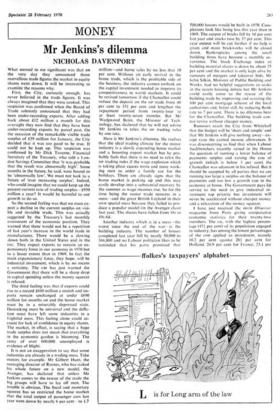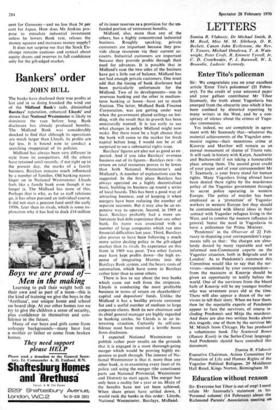MONEY Mr Jenkins's dilemma
NICHOLAS DAVENPORT
What seemed to me significant was that on the very day they announced those marvellous trade figures the market in equity shares went down. It will be interesting to examine the reasons why.
First, the City, curiously enough, has never believed in the trade figures. It was always imagined that they were cooked. This suspicion was confirmed when the Board of Trade solemnly announced that they had been under-recording exports. After adding back about £12 million a month for this oversight they now find that they have been under-recording exports by parcel post. On the occasion of the remarkable visible trade surplus of £39 million for January, the City decided that it was too good to be true. It could not be kept up. This suspicion was confirmed by Mr Dick Taverne, Financial Secretary of the Treasury, who told a Lon- don Savings Committee that 'it was probable that the result was abnormally high'. Some months in the future, he said, were bound to be 'abnormally low'. We must not look to a future of 'ever increasing surplus'. Indeed, who could imagine that we could keep up the present current rate of trading surplus—f950 million a year? It would be harmful to our growth to do so.
So the second feeling was that we must ex- pect a decline in the current surplus on visi- ble and invisible trade. This was actually suggested by the Treasury's last monthly assessment of the economic position. They warned that there would not be a repetition of last year's increase in the world trade in manufactures. There would be a slowing down both in the United States and_in the EEC. They expect exports to remain an ex- pansionary force in our economy in 1970 but to a lesser extent than in 1969. In fact the main expansionary force, they hope, will be industrial investment, which is by no means a certainty. The cal has just warned the Government that there will be a sharp drop in capital spending unless the money squeeze is relaxed.
The third feeling was that if exports could rise to a record £660 million a month and im- ports remain unchanged at under £690 million for months on end the home market must be in a miserably depressed state. Destocking must be universal and the defla- tion must have left some industries in a frightful mess. This feeling alone could ac- count for lack of confidence in equity shares. The market, in effect, is saying that a huge trade surplus does not mean that everything in the economic garden is blooming. The army of over 600,000 unemployed is evidence of blight.
It is not an exaggeration to say that some industries are already in a trading mess. Take motors for example. Mr Gilbert Hunt, the managing director of Rootes, who has staked his whole future on a new model, the Avenger, has declared that unless Mr Jenkins comes to the rescue of the trade the big groups will have to lay off men. The trouble is obvious. The fiscal and monetary squeeze has so restricted the home market that the total output of passenger cars last year went down by nearly 6 per cent—to 1.7 million—and home sales by no less that 18 per cent. Without an early revival in the home trade, which is the profitable side of the business, the industry cannot embark on the capital investment needed to improve its competitiveness in world markets. It could be revived tomorrow if the Chancellor could reduce the deposit on the HP trade from 40 per cent to 33# per cent and lengthen the repayment period from twenty-four to at least twenty-seven months. But Mr Wedgwood Benn, the Minister of Tech- nology, has declared that he will not advise Mr Jenkins to relax the HP trading rules by one iota.
Here is Mr Jenkins's dilemma. He realises that the ideal trading climate for the motor industry is a slowly expanding home market and a booming export market but he pro- bably feels that there is no need to relax the HP trading rules if the wage explosion which is taking place causes more and more work- ing men to order a family car for the holidays. There are already signs that the home market is picking up and this may easily develop into a substantial recovery by the summer as wage incomes rise. So for the time being the motor trade remains in a mess—and the great British Leyland in their own special mess because they failed to pro- duce a popular model (in the Avenger class) last year. The shares have fallen from 18s to lOs 6d.
Another industry which is in a mess—the worst since the end of the war—is the building industry. The number of houses completed last year fell by nearly 50,000 to 366.800 and no Labour politician likes to be reminded that his party promised that 500.000 houses would be built in 1970. Com- pletions look like being less this year than in 1969. The output of bricks fell by 10 per cent last year and stocks rose by 37 per cent. This year output will be cut further if no help is given and more brickworks will be closed down. Bankruptcies among the small building firms have become a monthly oc- currence. The Stock Exchange index of building material shares is down by about 25 per cent and the market is only kept alive by rumours of mergers and takeover bids. Mr John Silkin, Minister of Public Building and Works, had no helpful suggestions to make in the recent housing debate but Mr Jenkins could easily come to the rescue of the building trade by improving and assisting the 100 per cent mortgage scheme of the local authorities and, better still, by reducing Bank rate to 7 per cent. There is no dilemma here for the Chancellor. The building trade can- not revive without cheaper money.
Rumours reach the City from Whitehall that the budget will be 'short and simple' and that Mr Jenkins will give nothing away—ex- cept raise the earned income allowances. It was disconcerting to find that when Labour backbenchers recently raised in the House the question of running a lower balance of payments surplus and raising the rate of growth (which is below 3 per cent) the Chancellor was adamant in his refusal. But it should be accepted by all parties that we are running too large a surplus on the balance of payments and too low a growth rate in the economy at home. The Government pays lip service to the need to give industrial in- vestment top priority but investment will never be accelerated without cheaper money and a relaxation of the money squeeze.
I have just received the OECD Observer magazine from Paris giving comparative economic statistics for their twenty-two members. The UK, with the highest percen- tage (471 per cent) of its population engaged in industry, has among the lowest percentages of the GNP applied to investment, namely 18.2 per cent against 261 per cent for Holland, 24.9 per cent for France, 23.1 per
ffolkes's taxpayers' alphabet
L is for Long arm of the law
cent for Germany—and no less than 34 per cent for Japan. How does Mr Jenkins pro- pose to stimulate industrial investment unless he lowers Bank rate, relaxes the money squeeze and increases money supply?
It does not surprise me that the Stock Ex- change remains cautious and cynical about equity shares and reserves its full confidence only for the gilt-edged market.



































 Previous page
Previous page